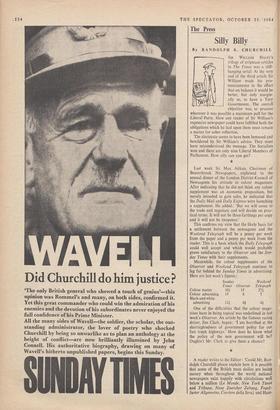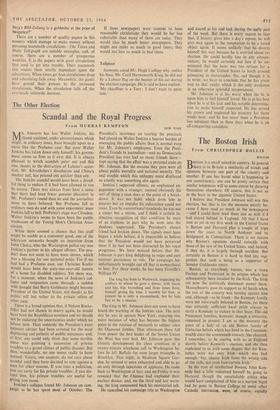The Press
Silly Billy
By RANDOLPH S. CHURCHILL SIR WILLIAM HALEY'S
The electorate seems to have been bemused and bewildered by Sir William's advice. They must have misunderstood the message. The Socialists won and there are only nine Liberal Members of Parliament. How silly can you get?
Last week Sir Max Aitken, Chairman of Beaverbrook Newspapers, explained to the annual dinner of the London District Council of Newsagents his attitude to colour magazines. After indicating that he did not think any colour supplement was an economic proposition, but merely intended to gain sales, he indicated that the Daily Mail and Daily Express were launching a supplement. He added : 'But we will come to the trade and negotiate and will decide on prac- tical terms. It will not be three-farthings per copy and it will not be twopence.'
This confirms my view that the likely basis for a settlement between the newsagents and the Weekend Telegraph will be a penny per week from the paper and a penny per week from the reader. This is a basis which the Daily,Telegraph could well accept and which would probably prove satisfactory to the Observer and the Sun- day Times with their supplements.
Meanwhile, the colour supplements of the Observer and Weekend Telegraph continue to lag far behind the Sunday Times in advertising. Here are last week's figures :
Sunday Times Observer
Weekend Telegraph Colour matter 104 15 271 Colour advertising
19 8 7 Black-and-white advertising 12+ 6+ 44 One of the difficulties that the colour maga- zines have in being topical was underlined in last week's Observer. An article by the famous racing driver, Jim Clark, began: 'I am horrified at the shortsightedness of government policy for our fast trunk highways.' How does he know what the policy of the new government will be? Oughtn't Mr. Clark to give them a chance?
A reader writes to the Editor: 'Could Mr. Ran- dolph Churchill please explain how it is possible that some of the British mass dailies are losing money when throughout the world national newspapers exist happily with circulations well below a million (Le Monde, New York Times and Tribune, Neue Zuercher Zeitung, Frank- furter Allgemeine, Corriere della Sera), and Ham- burg's Bild-Zeitung is a goldmine at the price of twopence?'
There are a number of quality papers in this country which manage to make money without pursuing mammoth circulations--The Times and Daily Telegraph are notable examples, and, of course, there are a number of prosperous weeklies. It is the papers with giant circulations that tend to get into trouble. Their mammoth size makes them utterly dependant upon the advertisers. When times get lean circulations drop and advertising falls away. Meanwhile, the giants have geared their presses to the increased circulations. When the circulation falls off the overheads relatively increase.
If these newspapers were content to have reasonable circulations they would be far less vulnerable than many of them are today. They would also be much better newspapers. They might not make so much in good times; they would not lose so much in bad times.
Tailpiece Someone asked Mr. Hugh Cudlipp why, unlike his boss, Mr. Cecil Harmsworth King, he did not fly a Labour flag on the bonnet of his car during the election campaign. He is said to have replied: 'My chauffeur is a Tory: I don't want to upset him.'



































 Previous page
Previous page